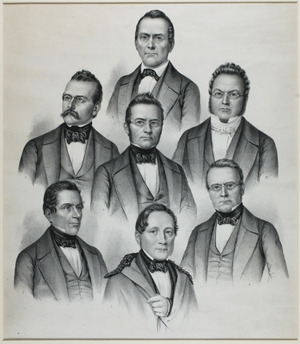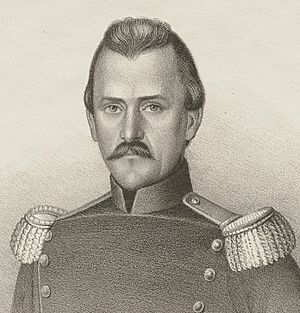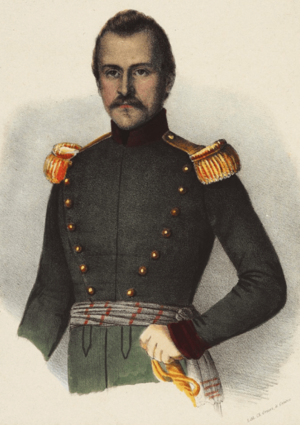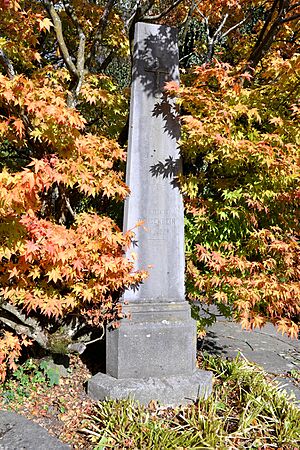Ulrich Ochsenbein facts for kids
Ulrich Ochsenbein (born November 24, 1811, died November 3, 1890) was an important Swiss leader. He was a lawyer, a military officer, and a politician. He also served as a member of the Swiss Federal Council from 1848 to 1854. The Federal Council is like the government of Switzerland.
Contents
Growing Up and Learning
Ulrich Ochsenbein was born on November 24, 1811, in Schwarzenegg, near Thun. He was the second of ten children. His parents were farmers and also ran a small inn. His father also bought and sold horses. Ulrich was very close to his mother.
His family later moved to Valais. Ulrich went to school in Granges-Marnard for seven years. His teacher was a French soldier, and Ulrich learned to speak French. In 1825, his father took over the inn at the post office in Nidau. Ulrich moved there too and learned to speak German.
He then went to a school called Gymnasium in Biel. There, he learned old languages like Latin and Greek. From 1830, he studied law at the Academy in Bern. He finished his studies in December 1834. After that, he became a legal expert, like a lawyer.
Becoming a Lawyer and Soldier
From 1835, Ulrich Ochsenbein had a law office with his brother-in-law, Eduard Sury. Their office was in Nidau. He also joined the local town council there and became its leader.
Ulrich also had a military career. In 1833, he was a sergeant in a federal mission in Basel Country. He was promoted to a junior officer in the artillery in 1834. In 1836, he became a Lieutenant. He was sent to the Bernese Jura region. Two years later, he was sent to the French border. This was when France threatened to invade if Switzerland did not hand over Louis Napoleon Bonaparte. But Bonaparte left Switzerland on his own, which stopped a conflict.
Leading in Conflicts
Ulrich Ochsenbein was a leader in an attack against Lucerne in 1845. This attack was not successful. More than a hundred people died, and 2,000 were captured by Lucerne. Ochsenbein and Jakob Stämpfli barely escaped. Because he led this attack, the Swiss government (called the Tagsatzung) removed him from the army's General Staff.
After this, some cantons (like states in Switzerland) formed a group called the Sonderbund. This group was against the central government. In 1847, Ulrich Ochsenbein led an army from Bern against the Sonderbund. His forces won the Sonderbund War.
His Political Journey
After the conflicts, Ochsenbein was elected to the Grand Council of Bern. This is like a state parliament. He quickly became a vice-president of the Executive Council. He was also a representative for Bern in the Tagsatzung. When he first joined the Tagsatzung in 1846, some leaders from the Sonderbund strongly opposed him.
He led a group of politicians in Bern called the Radicals, along with Jakob Stämpfli. This group later became the Free Democratic Party of Switzerland. He was a member of the Grand Council of Bern from 1845 to 1846. He also led the group that wrote the new constitution in 1846. From 1846 to 1848, he was a member of the government in Bern.
From 1847 to 1848, he represented Bern in the Tagsatzung and even led it in 1847. He played a big part in making sure the new Swiss constitution was accepted by the people. This happened in a vote on June 6, 1848.

On November 16, 1848, he was elected to the Federal Council of Switzerland. He was the second person ever to become a Federal Councilor. He served until December 31, 1854. In 1854, he lost an election to Jakob Stämpfli. Stämpfli was then chosen for the Federal Council instead of him. Ulrich Ochsenbein is one of the few Federal Councilors who was voted out of office.
During his time in the Federal Council, there was a disagreement between different political groups. He did not want to pick a side, so he lost the trust of both groups. While in office, he was in charge of the Military Department, which is like the defense department.
Life After Swiss Politics
After leaving politics in Switzerland, Ulrich Ochsenbein thought about moving to America. Instead, he became a military officer in France. He served as a Brigadier General in the German-French War. People in Switzerland noticed that a former head of their military department was serving in a foreign army.
For a long time, he was not remembered much by Swiss politicians. But in recent years, especially after a book about him was published in 2009, his importance has been recognized again.
Later Years
After his military service in France, he returned to Nidau. He disagreed with some of the government's decisions, like those about education and railways. This did not make him more popular. He passed away in Nidau in November 1890.
 | Precious Adams |
 | Lauren Anderson |
 | Janet Collins |




